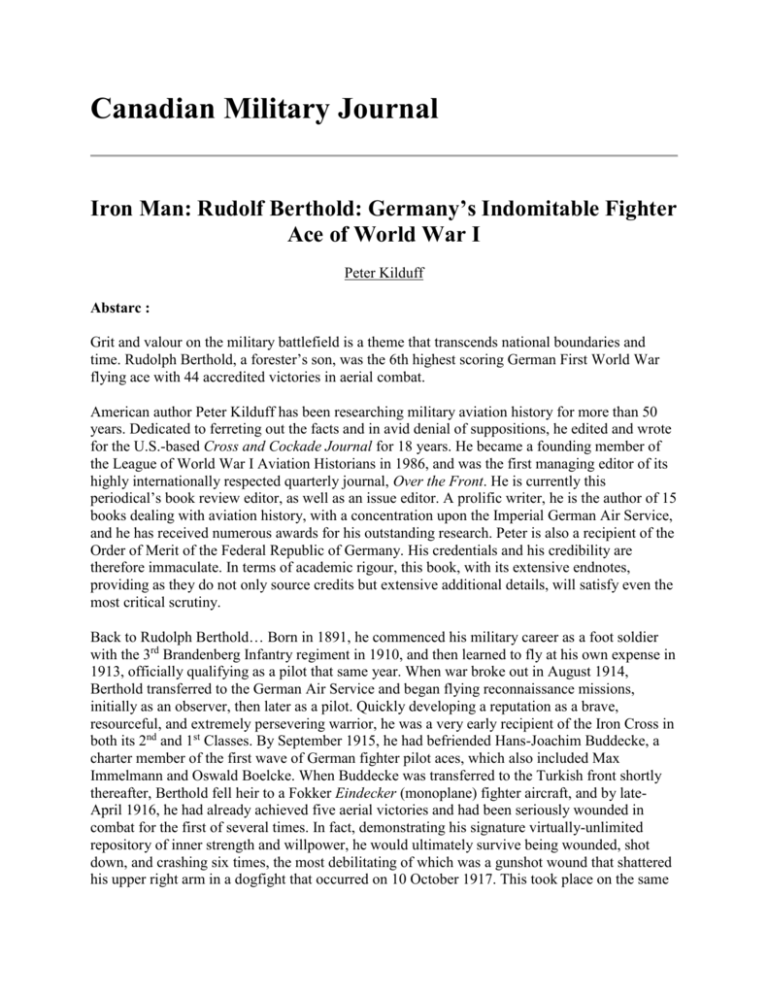Iron Man: Rudolf Berthold: Germany`s Indomitable
advertisement

Canadian Military Journal Iron Man: Rudolf Berthold: Germany’s Indomitable Fighter Ace of World War I Peter Kilduff Abstarc : Grit and valour on the military battlefield is a theme that transcends national boundaries and time. Rudolph Berthold, a forester’s son, was the 6th highest scoring German First World War flying ace with 44 accredited victories in aerial combat. American author Peter Kilduff has been researching military aviation history for more than 50 years. Dedicated to ferreting out the facts and in avid denial of suppositions, he edited and wrote for the U.S.-based Cross and Cockade Journal for 18 years. He became a founding member of the League of World War I Aviation Historians in 1986, and was the first managing editor of its highly internationally respected quarterly journal, Over the Front. He is currently this periodical’s book review editor, as well as an issue editor. A prolific writer, he is the author of 15 books dealing with aviation history, with a concentration upon the Imperial German Air Service, and he has received numerous awards for his outstanding research. Peter is also a recipient of the Order of Merit of the Federal Republic of Germany. His credentials and his credibility are therefore immaculate. In terms of academic rigour, this book, with its extensive endnotes, providing as they do not only source credits but extensive additional details, will satisfy even the most critical scrutiny. Back to Rudolph Berthold… Born in 1891, he commenced his military career as a foot soldier with the 3rd Brandenberg Infantry regiment in 1910, and then learned to fly at his own expense in 1913, officially qualifying as a pilot that same year. When war broke out in August 1914, Berthold transferred to the German Air Service and began flying reconnaissance missions, initially as an observer, then later as a pilot. Quickly developing a reputation as a brave, resourceful, and extremely persevering warrior, he was a very early recipient of the Iron Cross in both its 2nd and 1st Classes. By September 1915, he had befriended Hans-Joachim Buddecke, a charter member of the first wave of German fighter pilot aces, which also included Max Immelmann and Oswald Boelcke. When Buddecke was transferred to the Turkish front shortly thereafter, Berthold fell heir to a Fokker Eindecker (monoplane) fighter aircraft, and by lateApril 1916, he had already achieved five aerial victories and had been seriously wounded in combat for the first of several times. In fact, demonstrating his signature virtually-unlimited repository of inner strength and willpower, he would ultimately survive being wounded, shot down, and crashing six times, the most debilitating of which was a gunshot wound that shattered his upper right arm in a dogfight that occurred on 10 October 1917. This took place on the same day he became just the 10th of an eventual 81 aviation recipients of the Order Pour le Mérite (the fabled ‘Blue Max’), Imperial Germany’s highest decoration for combat valour, and the German equivalent of the Victoria Cross. By this time, he had amassed 28 confirmed aerial victories. Incapable of admitting defeat, he continued to fly operationally, even when he had to be carried to and from his aircraft. He also rejected any surgical help, even refusing to have the offending bullet removed from his upper arm, believing as he did that having surgery would make it impossible for him to continue flying. In continuous pain from his untreated wounds, he persevered relentlessly, setting a shining example of fortitude for his contemporaries and for the men under his command. Key Word : Iron Man: Rudolf Berthold: Germany’s Indomitable Fighter Ace of World War I Volume 14, Number 1, - 2014







